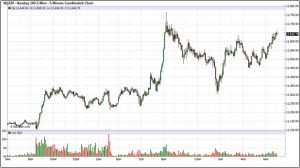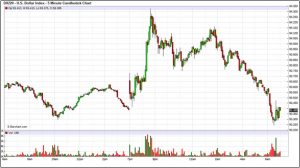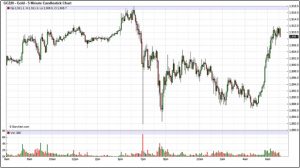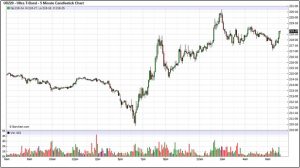Daily Comment (November 4, 2020)
by Bill O’Grady, Thomas Wash, and Patrick Fearon-Hernandez, CFA
[Posted: 9:30 AM EDT] | PDF
Our Daily Comment today opens with the latest on the U.S. election situation, including a detailed recap of market action in the key asset classes overnight. Believe it or not, there has also been news overseas while we’ve all been preoccupied with the U.S. polling. We focus on a major development in China’s stance toward financial regulation. As always, we review the latest coronavirus news.
U.S. Elections: As of this writing, the presidential election remains too close to call. Out of the 270 electoral college votes needed to win, news organizations have called some 238 for Vice President Biden and 213 for President Trump. However, counting continues in key battleground states such as Wisconsin, Michigan, and Pennsylvania. This is actually normal; counting usually continues after Election Day itself. What’s not normal is that the huge surge in absentee and mail-in voting means the counting will likely continue for days. Officials in Nevada, where only about 86% of the ballots have been counted so far, said they won’t even release updated totals until Thursday. The most important development is that the expected “blue wave” of votes for Biden after the polls closed has not materialized, leaving increased uncertainty regarding where things stand. As we suggested yesterday, we all need to remain patient as election officials count our votes and the votes of our fellow citizens.
- Shortly after 2 a.m., President Trump told supporters gathered in the White House’s East Room that he felt he had already won the election. He also hinted he would ask the Supreme Court to stop ongoing counting. Speaking in Delaware before hundreds of vehicles in a car rally, Biden promised his supporters that their patience would ultimately be rewarded and said, “We believe we’re on track to win this election.”
- In addition to the absence of a blue wave for Biden, it is looking like the Democrats’ hopes of taking control of the Senate will be dashed. As with the presidential race, however, counting continues, and the final totals won’t be known for days.
- Market volatility has been extremely high as the votes have come in and various trends have arisen and fallen back. Here is what we’ve seen in the key asset classes:
- Equities. As the polls began to close, it became increasingly obvious that Biden’s “blue wave” wasn’t coming. Investors who were complacent about a Biden win are now adjusting portfolios for the prospect that President Trump could remain in office. With the idea that the path of policy would be more of the same, NASDAQ futures roared higher (around 9:00 pm CST), actually going limit up and forcing a trading halt for two minutes. As the evening wore on, this index, dominated by tech firms, has held up (see graph below). This market is betting that any future stimulus will be modest at best.

-
- The Dollar. The dollar tells a similar story. When the GOP was outperforming, the dollar jumped. But, as we head into the morning and the possibility that Biden might win after all, the likelihood of dollar-bearish policy has led to a drop in the greenback (see chart below).

-
- Gold. The market action with gold has been a near mirror image of the action in the dollar (see graph below).

-
- Bonds. Long-duration bond prices also had a wild night. Prices initially fell on expectations of a blue wave, but as those expectations dissipated, long-term yields fell sharply and remain depressed. Safe-haven buying, along with reduced chances of a massive fiscal stimulus bill out of Congress, are combining to keep Treasury yields sharply lower so far today. The 10-year Treasury-note yield broke above 0.90% early in the evening, but it has now fallen back into the 0.70% area.

China: The key non-U.S. news yesterday was that the Shanghai Stock Exchange suspended the blockbuster initial public offering by Ant Financial that was scheduled for Thursday. According to the exchange, the suspension was necessary because of a “changing regulatory environment” after billionaire founder Jack Ma was hauled into a closed-door meeting with four key financial regulators on Monday. The suspension forced Ant, which owns the Chinese digital payments platform Alipay, to also suspend the half of the IPO that was supposed to launch in Hong Kong on Thursday.
- The sudden roadblock was especially surprising because the Hong Kong and Shanghai exchanges, as well as China’s securities regulator, had earlier green-lighted Ant’s plans to go public. The largest ever IPO would also have been a major feather in the cap of Shanghai’s fledgling Nasdaq-style Science and Technology Innovation Board, known as the STAR Market, which is a pet project of Chinese President Xi Jinping.
- News reports suggest the reason for the suspension was the Chinese regulators’ demands for Ant to make a bigger commitment to low-profit microlending. However, the timing of the action, just days before the planned IPO, suggests something else is going on. Some have speculated the problem was with statements Mr. Ma made at a recent conference, which were interpreted as an insult to Chinese regulators. If so, the incident will paint Chinese financial markets as an unsophisticated venue where political sensitivities reign supreme, which in turn would undermine investor confidence in Chinese markets. In any case, the New York shares of Alibaba Group (BABA, 285.57), which owns a 33% stake in Ant, fell 8.1% on Tuesday following the IPO suspension.
U.S. Technology Sector: A new analysis by the Wall Street Journal shows that while the U.S. and Europe produced more than three-quarters of the world’s semiconductors in 1990, they now produce less than one quarter. The analysis suggests the epicenter of chip production has shifted in part because governments outside the U.S. offered often hefty financial incentives for factory construction to build up their domestic industries. Chip companies have also been attracted by growing networks of suppliers outside of the U.S., in addition to an expanding workforce of skilled engineers capable of operating expensive manufacturing machinery.
Europe: A series of technology glitches at stock exchange group Euronext is feeding concerns that its efforts to build a central role in the region’s capital markets could intensify risks around a single point of failure. On Monday, trading in warrants across Euronext’s network halted for an hour, just two weeks after a chaotic day disrupted trading across equities, exchange-traded funds, derivatives, and other markets.
Brazil. Prosecutors have filed graft charges against the son of President Bolsonaro. The move ratchets up pressure on the conservative leader, who came to power on the promise of stamping out corruption. The increase in political risk could also be a new headwind for Brazilian assets.
Ethiopia: Prime Minister Abiy Ahmed said he sent federal troops to quell a rebellion in the northern region of Tigray. This escalation of tensions brings Africa’s second-most populous country to the brink of civil war.
COVID-19: Official data show confirmed cases have risen to 47,555,607 worldwide, with 1,216,173 deaths. In the United States, confirmed cases rose to 9,385,505, with 232,638 deaths. Here is the interactive chart from the Financial Times that allows you to compare cases and deaths among countries, scaled by population.
Virology
- New confirmed U.S infections totaled more than 91,500 yesterday, lifting the seven-day moving average to 86,363 and the 14-day moving average to 79,124. New deaths related to the virus totaled 1,130, and the number of people hospitalized nationally for the disease topped 50,000. Europe is also fighting an autumn wave of new infections, with mass economic lockdowns being imposed again in several countries. Without a doubt, the new infections and restrictions will slow the current recovery from the first wave of infections, posing at least some headwind for risk assets.
- In France, shopkeepers are revolting against the government’s renewed lockdowns, complaining that closures make it impossible to compete against major online retailers that can still sell via the internet.
Economic Impacts
- In Europe, the renewed lockdowns associated with the autumn infection wave have already shown up in service sector data. Spain’s October IHS Markit Purchasing Managers’ Index for services fell to a five-month low of 41.4, while Italy’s index fell to a four-month low of 46.7. The overall services PMI for the Eurozone fell to 46.9 in October from 48.0 in September. Like all major PMIs, the indexes are designed so that readings below 50 point to falling activity.
- The wave of new restrictions on service activities, like restaurant service, is creating surging demand and supply shortages for outdoor heaters.
- Saudi Arabia and other OPEC members are considering deeper oil production cuts as rebounding COVID-19 cases in the West and fresh economic lockdowns in Europe threaten to curb oil demand further.
U.S. Policy Response
- The Federal Reserve’s latest policy meeting starts today and will end tomorrow. No significant change is expected in the ultra-loose monetary policy put into place earlier this year to counter the economic impact of the pandemic, but officials have hinted they may start discussing adjustments to their asset purchase programs.


